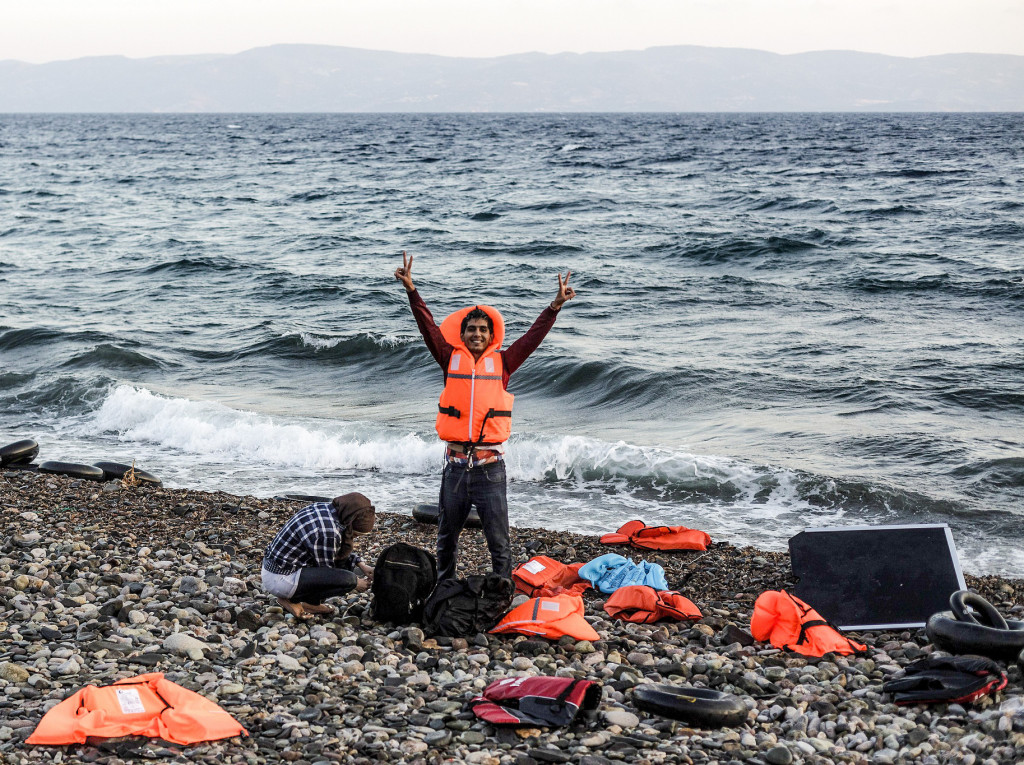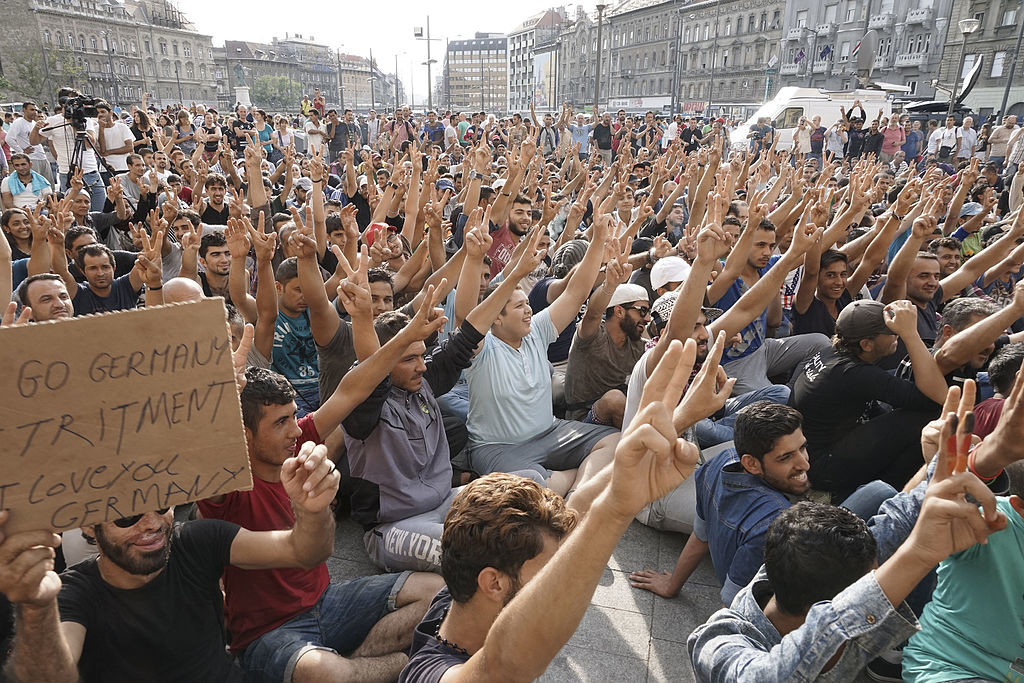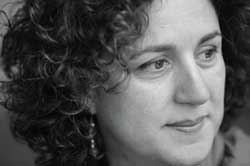In this personal essay, Halleh Ghorashi asks if we can find a way to see the refugee crisis in terms of opportunity. How can we remove the obstacles to integration and acceptance? Not only that, how can we all find ways to choose for happiness? She uses her own experience as an example.
December 2015

Refugees: a Different Mindset for Europe?
This summer we were forced to face the horrible images of refugees and their children who, looking for safe havens in Europe, met terrible deaths What can Europe do? It seems inevitable to think that this continent simply cannot take in all these refugees. Europe itself is only just recovering from a crisis and is already struggling to cope with the migrants and refugees living within its borders. Can we even consider taking in new refugees when there is currently so much antagonism? At a time when social media is filled with heartless messages about lifeless bodies floating in the sea, can we still expect to see the merciful side of Europe?
Europe is much more than a closed and xenophobic continent
The power of Europe is that it manages to surprise us. I had barely written the lines above when they were superseded by news of heart-warming welcoming initiatives. The shocking picture of Aylan, the little Kurdish boy washed up on the beach, impelled many politicians, artists, activists and citizens to take action. Resentful messages no longer domintated. Europe’s humane side had been marginalized over the past few years by a discourse dominated by hate. But Angela Merkel and many other concerned politicians and citizens together showed that Europe is much more than a closed and xenophobic continent. For many people like me, it was particularly encouraging to re-experience this somewhat endangered side of Europe.
But these emotions were also to be supplanted by reality. The week of 14 September 2015 became the week that Europe closed its borders to refugees; the week of desperate refugees who were just a bit too late to make it across the border; the week of cold and clinical rationality that called feelings of solidarity emotional and, hence, irrational.
Recent events involving refugees have shown us many different facets of Europe. Is it possible to connect its humane side with a realistic approach? Here I’d like to make a case for a rational form of solidarity.
Merkel shows a different mind-set
Is it possible to acknowledge the refugees’ added value without neglecting their traumatic pasts?
What makes Merkel’s story historic is that she, the strongest European leader, is showing that you can choose to take a different perspective. It is all about a different mind-set: one that is not about what Europe cannot do but about what it can do.
That is the mind-set of an enterprising and progressive Europe that is connected with the world around it. A mind-set that refuses to allow the European ideal of opportunities and safe havens to be hijacked by resentful emotions. A mind-set that fits a Europe that, despite many examples of violence and exclusion, also knows many remarkable stories of solidarity and openness. How, then, could we make such a kind of gracious form of rationality work?
It was Leo Lucassen who gave an initial impetus to this question when he observed in the NRC of 6 May 2015 that we should be looking at the contributions refugees in the Netherlands can make. He argued that refugees are not pitiful, helpless creatures but people whose human capital can make a genuine contribution to an aging Europe. Stephan Sanders, in his response in Vrij Nederland (16 September 2015), called this unrealistic, writing that escaping a war zone does not make people any more creative or funny and that we should not forget that refugees experience trauma. His view is that we should not first admit people in an emotional reflex and then send them away or exclude them.
What I propose is to connect these two points of view in the debate. Is it possible to acknowledge the refugees’ added value without neglecting the traumas in their backgrounds?
How can we include refugees in the long term?

Refugees, like other people, show much the same diversity in their historical backgrounds, in potential, and, notably, in their share of luck in putting their potential to good use. So what might be a scenario for facilitating refugees in such a way that allows them to make the most of their human capital? How can we proceed from the warm welcome some refugees receive to their inclusion and well-being in the Netherlands in the long run? Let’s take a look at the lessons we have learned in the Netherlands over the past few decades.
Here is what studies are showing us:
- The first years of residence are crucial for long-term well-being. People who reach a safe haven after an arduous and traumatic journey want to make a new start right away, which would allow them to invest in their present and future lives rather than compel them to remain prisoners of the past. It is disastrous for refugees to remain in refugee centers without being able to work towards a new future. This keeps them imprisoned in the past and forces many of them into a downward spiral that is hard to reverse.
- Refugees are potential entrepreneurs and survivors. Most refugees need minimal facilities to survive. In the early stages, they particularly need access to practical information and contacts with relevant parties so they can slowly but surely find their way around in their new society. Policies and aid efforts, therefore, should target real needs and meet them in a custom-made fashion. In practice, this requires patient listening skills to be able to spot both needs and hidden talents.
- Once refugees are ready to enter the labor market at the required levels, employers should be open to taking them on in professional jobs. Working in professional jobs is crucial in rebuilding self-esteem and in being able to give something back to society. Several studies show that despite successful integration in terms of language proficiency, professional training, and social contacts, unemployment figures among refugees continue to be high. One of the reasons for this is the extreme fixation on the shortcomings of this group instead of what they have to offer: their qualities and talent. This leads to a situation where even the most integrated groups feel undervalued and often excluded. In the academic literature, this phenomena is known as the integration paradox.
My own life is an example

In a realistic long-term view of inclusion, it is essential to take these three lessons to heart. My own life is a case in point. When I arrived in the Netherlands in the late eighties, I found a rented room in the Bijlmer area of Amsterdam. I quickly learned to speak the language, and, with the aid of the Foundation for Refugee Students (UAF), I enrolled in a university program one year after my arrival. These were not easy times, but I was determined not to lose a single second. Being a student gave me a positive perspective that was the complete opposite of my insecure life as an asylum seeker. My escape from Iran certainly did not make me any funnier or more creative, but it did make me dedicated and determined to turn my new life into a success.
My life as a student also helped me to move beyond the trials of the past, to detach myself temporarily from the most painful memories, and to share the more positive stories from my past with other people. The open ears of my fellow students and teachers gave warmth and purpose to my life. In the first few years of my residence in the Netherlands, their curiosity and openness in accepting me as a human being with a story to share was crucial. Gradually, my contacts with other people and the opportunity to fully take part in everyday life brought joy back to my life. Small conversations grew into special friendships.
I am no exception, but I was fortunate
This active start was crucial in building the life I now have. I am no exception, but I have been fortunate. I was given the opportunity to develop myself and build a new life without delay, and I was fortunate enough to encounter people along the way who made me feel I mattered. This was a golden combination. Things might have turned out very differently. I have seen many along the way who had had a quite different experience. Of course, not everyone has the same fortune in life, but we should do all we can to invest in those conditions that improve our chances of happiness.
It all starts with a different mind-set, with seeing things as opportunities, as Merkel and Lucassen do, rather than as obstacles. After that, we need the dedication of people who are willing to embody Europe’s humane side and to counteract the dominance of its resentful side. This is the synergy I was mentioning before: a society that combines its humanity with a realistic long-term vision, creating the opportunities and conditions for refugees to develop themselves and become part of this society, in spite of their differences. To realize that we need all parties (individuals, civil society, and politicians) to join forces and provide and enact a strong alternative narrative to the growing negative discourse on migrants and refugees in Europe.
Halleh Ghorashi is professor of diversity and integration at the department of Sociology at the Vrije Universiteit Amsterdam, the Netherlands.
